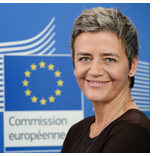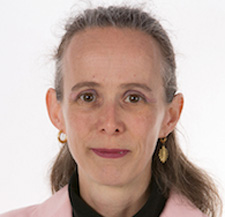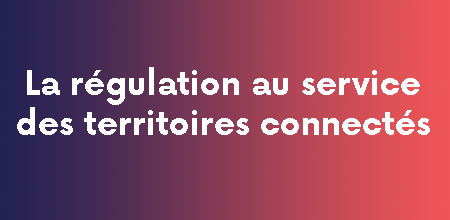 |  Competition and investment in network industries Competition and investment in network industries
Everything today is getting connected to the Internet, from e-Health, to connected cars and precision farming. We need to offer high-speed Internet connections and ensure widespread 5G mobile access.
A lot of the necessary investment will result from competition; there is no trade-off between competition and investment. To the contrary, competition is a key driver for investment in telecoms networks. When companies compete fiercely, they invest, and in turn spur their competitors to invest. Take, as an example, alternative operators, which have invested billions in infrastructure in France, Italy or Spain.
We are confident that the European Commission's proposed Electronic Communications Code would help to cut the cost of building new networks. It would encourage telecoms companies to build joint networks in the countryside – with the help of public funds – where it wouldn't be profitable for them to invest on their own. Our state aid rules make it easier for governments to support that investment. We support appropriate mapping of network deployment, as this helps to channel public support to the areas most in need.
At the same time, investment is not an end in itself, as investment as such does not directly benefit consumers. It is the impact of investment on parameters of competition, such as lower prices, better quality of service or greater take-up of telecoms services that translates into consumer benefits.
The recent launch by ARCEP of a platform allowing consumers to signal issues encountered with telecoms operators is a welcome example of how authorities can directly help consumers.
Margrethe Vestager, Commissioner for Competition

|  |
 |
Regulation in action
Early renewal of 2G/3G mobile licences: an historic opportunity
At the Government’s request, Arcep is currently in the process of examining the possibility of an early renewal for mobile operators’ 2G/3G frequency licences (900 MHz, 1800 MHz and 2100 MHz bands).
Scheduled for 2020 and 2021, this renewal would be an historic opportunity to accelerate mobile coverage and improve quality of service. New, more stringent obligations could be imposed on operators. In exchange for these increased objectives, operators would obtain certainty on their access to frequencies and their licensing fees. A proposal that Arcep already made in its opinion to the Senate in late October on accelerating digital coverage in France.
At the Government’s behest, Arcep is already engaged in a dialogue with mobile operators over the additional commitments they could make, over and above their current rollout schemes.
Arcep’s Executive Board has spoken with representatives of associations of local officials, and is interacting with teams on technical issues, to share information on the high expectations shared by consumers and business across the country.
What comes next: in late November, Arcep will submit a draft proposal for frequency licence renewal to the Government, which is expected to then make a decision before the end of the year.
|  |
 |
|
On our radar
| |
Florence Comparat, New President of the Open Data France association
This association has been uniting and supporting local authorities in their open data procedures since 2013.
| 
|
|
| |  | |
News from around the world
In Japan, the mobile operating system (OS) market has attracted the attention of the country’s Fair Trade Commission (JFTC) and its Ministry of Economy, Trade and Industry (METI). Both of these authorities have elected to follow through on the investigation they conducted on the matter last year.
Concerns are galvanising around the ability to develop competing OS, and the issues created by having certain apps installed by default on devices or given preferential treatment.
Expert panels will be created to take a deeper look into the matter. This will be followed by proposals for possible solutions through revised consumer or trade laws.
Japan Fair Trade Commission report from 2016
|
| |
 |
12 December in Paris

“Regulating on behalf of digital territories” – Arcep’s annual conference
Let’s step up the pace! These are the watchwords for Arcep’s conference devoted to regulating on behalf of digital territories. The morning of debates will focus on two topics:
· “National coverage: what are the priorities?”
· “Fixed superfast network rollouts: what guarantees for 21st century infrastructure?”
This year, Arcep’s teams will host discussions on three more wide-ranging topics: monreseaumobile.fr / 5G: issues and challenges / The business market
The programme
|  |
 |
27 November in Paris
Presentation of the Digital Market Barometer
Which device do French people use the most to browse the Web? Do they access the internet more over mobile or fixed networks? A presentation on 27 November will reveal the findings of the latest edition of the Digital Market Barometer: a benchmark study of the French population’s digital consumption habits. This statistical report is produced by CREDOC on behalf of Arcep, the Economic General Council and the French Digital Agency. On hand to comment on the findings will be France’s Secretary of State for Digital Affairs, Mounir Mahjoubi, and Arcep Executive Board member, Martine Lombard.
28 and 29 November in Paris
AVICCA TRIP 2017 Autumn symposium
The main annual event for digital regional development stakeholders, AVICCA is hosting its autumn symposium on 28 and 29 November. Arcep chairman Sébastien Soriano will be speaking on 28 November.
Find out more (in French)
29 and 30 November 2017 in Bonn
European Regulators Group for Postal Services (ERGP) Plenary Meeting
European NRAs responsible for regulating the postal sector will be meeting on 30 November in Bonn. Topics will include the parcel market for e-commerce sales. The meeting will be preceded by a workshop on the 29th devoted to new developments, challenges and solutions for postal services in Europe. Arcep will be represented by Executive Board member, Françoise Benhamou.
30 November and 1 December in Helsinki
Slush
Finland will be the epicentre of the global digital ecosystem later this month. Slush is 17,500 participants over two days, more than a million views on its streaming platform and 2,500 start-ups in one place. In other words, the digital place to be!
Find out more
13 December in Brussels
BEREC public debriefing
The final public debriefing for Sébastien Soriano’s tenure as BEREC Chair, before handing over the reins to the Austrian regulator. This press conference will provide Mr Soriano with an opportunity to review the main issues that were addressed at the BEREC plenary meeting being held from 6 to 8 December in Copenhagen.
Find out more
| |

 |
|  |
|

